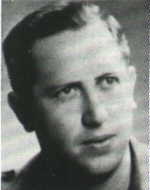Eisen, Mordechai (“Motke”)
Son of Jacob and Shoshana. He was born on March 14, 1927 in Jerusalem. Fourth generation in Israel. He spent his childhood in the “cheder” and in the beit midrash, but from his father, he and his two younger siblings were brought to the Diskin orphanage in Jerusalem. He stayed there for a year or two, but his soul was consumed by a different activity. He stopped honoring religious values, cut off his sideburns. He went out to work a day and studied the evening classes. Mordechai was active in the ranks of the Irgun underground, took part in several operations in Jerusalem, and later moved to the Hagana, where he joined the ranks of the IDF in 1948. During the War of Independence he fought in Jerusalem as a regular fighter, but during one of the breaks he was transferred to the Negev with a mortar unit and then transferred to the Signal Corps. His path began as a connection. He completed his advanced course in the Signal Corps, served as one-third of the heads of the Jewish Fighting Organization and served as the head of the Military Center – In 1951, he married a wife and established a home in Israel, where he had a daughter and a son, and his second dedication to work and many hours of absence from his home prevented him from spending much time with his family and children. His eldest daughter on the wedding canopy, and to watch the growth and development of the younger daughter peacefully, and he died on January 22, 1972. He left a wife and three children. He was laid to rest in the military cemetery in Kiryat Shaul. One of his colleagues drew up his character in writing: “Motke served in a variety of roles, and all of them worked in the best possible way, and his rise to the ranks was not relatively quick and should be attributed to his dedicated and efficient role in every position until every commander felt that his transfer to another position was lost. For his part, he made every effort to keep him in his post for as long as possible, and he liked the role of liaison officer in the unit, and was very satisfied when he was transferred to his post. This was successful in the Six-Day War, and Motke could be relied upon one hundred percent Which gave him confidence in even the most critical hours, and was not only an excellent professional but also capable of improvisation, even in the most difficult situations. ” He adds: “He had a pleasant and good temperament, with a broad and charming smile and was ready to help and help all his friends and acquaintances.” Another friend does not dwell on his actions, but rather on the way he performed them, a way in which his special character, the officer and the person, stood out. His handling of the matter was thorough, meticulous, and meticulous. He was prodded in time of need, striving to advance the matter, faithful to his way of thinking and catching up with all his men with his enthusiasm – all in a kind of calm that was typical of him, like a great experienced brother, or sometimes as a good and energetic father. ” Two and a half years, notes several lines to his image: “Mordecai liked to share the data with his relatives so that the man would understand, know and deliberate his decisions. He would explain again and again, without anger and indignation, always with a smile of understanding. This gave his assistant a great feeling at work. On the one hand, he was a commander who knew how to press and get the full output from his subordinates, and on the other hand he knew how to calm, smile and instill a pleasant and friendly atmosphere without pretense. “
